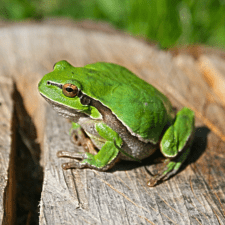April is Frog Month! Frogs aren’t the most popular pets around. In fact, they’re lounging around somewhere on the bottom of that list, not doing much but just sitting there looking cute. However, they are becoming more popular, particularly as children’s pets. Tree frogs are definitely hopping into the spotlight here. They’re small, super cute, and easy keepers. A Anderson, IN vet offers some information on these guys below.
Types Of Tree Frogs
There are over 800 types of tree frogs, including the Red Eyed Tree Frog, a master of camouflage; White’s Tree Frog; and Grey Tree Frogs. Despite the name, they don’t spend all of their time in trees. They can live as long as 15 years. They are pretty small; even the largest ones rarely get longer than 5 inches.
Housing
Tree frogs can have tropical lizards as roommates. They can also live with other frogs, as long as they are about the same size. (The exception here is the Cuban tree frog, a definite loner.) You’ll need a fairly tall terrarium, so you can give your little pet a small decorative tree to climb. Size-wise, you’ll need at least a 10-gallon terrarium. Make sure to pick one with a screened or mesh lid! Add a few inches of bark or coconut fiber substrate, as well as lots of things for your pet to climb and look cute on, like rocks and artificial branches.
Environment
Your frog won’t need sunlight, but he will need a cycle of light and darkness. You may find it easiest to cycle between a fluorescent bulb and a night-specific one. Keep conditions between about 75 and 85F during the day, and between 65 and 75F at night. Humidity levels will need to stay between 50 and 80 percent. Keep in mind that each type of frog has specific care needs, so do some breed-specific research and ask your vet for advice.
Health
Keep a close eye on your tiny buddy! Some of the things to watch for would be reduced intake of food and/or water, weight loss, excessive hiding, discoloration, discharge, runny droppings, and swollen joints. Contact your vet right away if you notice anything amiss! Many issues can be treated with medication, but they need to be caught early.
Do you have questions about your frog’s health or care? Contact us, your local Anderson, IN animal clinic, today!









